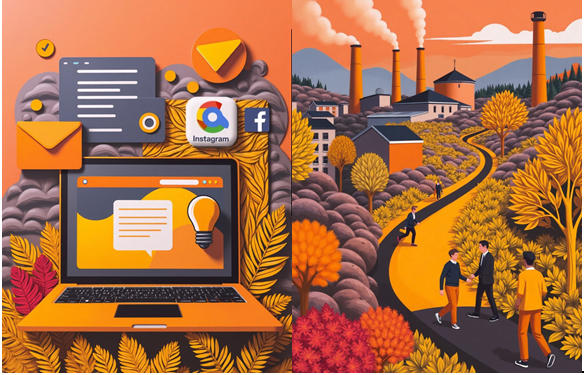
Introduction
The way we do business has changed more in the last 10 years than in the last 100. Thanks to the internet, starting a business doesn’t require a storefront, inventory, or even a fixed location. But that doesn’t mean traditional businesses are dead. They still offer real-world value and deep community connections. Complete e-commerse business can run through online its an internet business where digital enterprises can be built. it can be web based business or online stores so what’s better in 2025: running a digital business or sticking with the traditional model? In this guide, we’ll break down the pros and cons of both, compare them side-by-side, and help you decide which one is right for you.
What Is a Traditional Business?
A traditional business is one that operates from a physical location — like a retail store, salon, restaurant, or local service company. hense These businesses rely heavily on face-to-face interactions and often cater to a specific geographic area. You’re dealing with real estate, foot traffic, and fixed hours of operation.
What Is an Online Business?
An online business, also called a digital business, is operated primarily through the internet. It can be an e-commerce store, a blog, a freelancing service, or a software platform So, Online businesses allow you to reach customers globally, work remotely, and often require less upfront capital.
Pros of Traditional Business
- Builds personal, face-to-face customer relationships which are mostly limited to local areas
- Often trusted more by older demographics
- Local reputation and walk-in traffic can drive steady income
- Easy to establish within your community which improves and interactions in public to promote social welfare
Cons of Traditional Business
- High setup and maintenance costs (rent, inventory, staff)
- Limited customer reach (local only)
- Requires physical presence and long working hours and more fatigue
- Difficult to scale quickly
Pros of Online Business
Low startup costs (often just a laptop and internet connection)
- Work from anywhere, anytime
- Reach a global audience instantly within less period and less cost
- Easier to scale with automation and digital marketing tools
- Access to endless learning and growth opportunities
Cons of Online Business
Requires strong digital and marketing skills
- Tough competition in many niches
- Can be harder to build trust online
- Dependent on stable internet and digital platforms
Side-by-Side Comparison Table
Feature | Traditional Business | Online Business |
Setup Cost | High | Low |
Customer Reach | Local | Global |
Work Flexibility | Fixed hours | Work from anywhere |
Scaling Potential | Limited | High |
Startup Time | Weeks/months | Days/weeks |
Ongoing Costs | Rent, utilities, inventory | Hosting, tools, marketing |
Trust Factor | Higher initially | Needs to be built online |
Why Online Business Makes More Sense in 2025
While both models have their place, online businesses offer unmatched flexibility, speed, and global reach. With tools like Shopify, ConvertKit, Canva, and Systeme.io, almost anyone can launch a business in days — without a big budget. For first-time entrepreneurs, creators, freelancers, and side hustlers, online business is simply more practical and scalable in today’s world.
Final Thoughts
Both online and traditional businesses have their strengths. If you love meeting people in person and serving your local community, traditional might be your style. But if you’re looking for freedom, flexibility, and the ability to grow globally — all with low risk — online business is the clear winner.